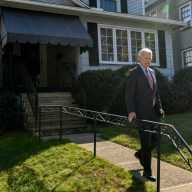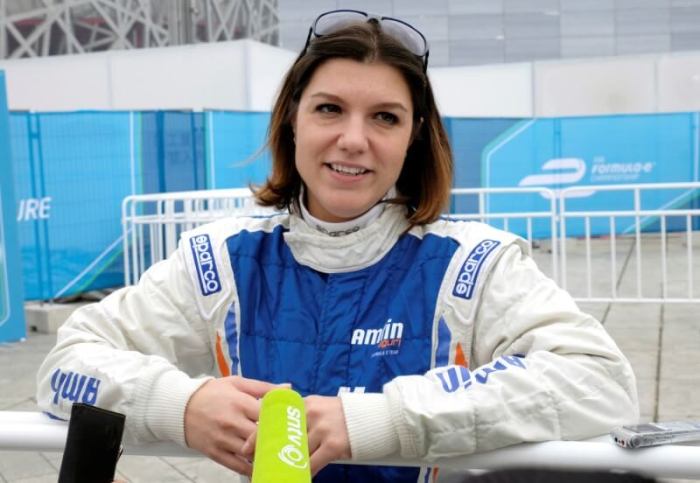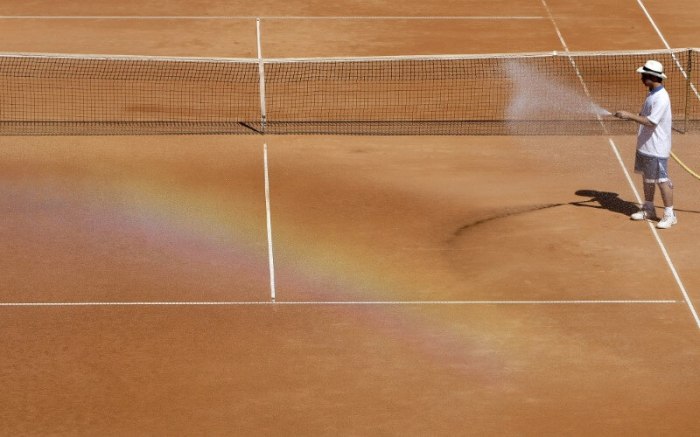By Mari Saito
IITATE, Japan (Reuters) – Kazuo Ouchi drives down a single-lane road through sheets of rain until he reaches a gravel driveway leading to a weathered farmhouse. Yellowing lace curtains are drawn tight over the windows, shutting out the weak winter light.
“Sorry about the dark,” Ouchi says, stepping over children’s toys. “I shut off the electricity a while ago.”
Ouchi is back in his hometown of Iitate, a village in Fukushima prefecture. His two-story house has sat empty for nine years after a massive earthquake and tsunami triggered meltdowns at a nuclear plant 30 miles away, spewing radiation into the air and forcing the entire village to evacuate.
Remnants of a hastily abandoned life are everywhere in the house. In an upstairs room, dozens of photographs hang from the walls. In them, a cast of children, first toddlers, then teens and later young men in awkward tuxedos, smile from behind dusty plastic frames.
“There’s Ryoma,” Ouchi says, pointing to a picture of a swaddled baby.
Like most parents, it’s hard for him to believe that the boy in the picture is already 18 years old. Ryoma left the family’s new home and his father only the night before, a few hours after receiving his high school diploma. He was headed to play baseball at a university hundreds of miles away, the first to leave the close-knit family.
There were no tearful goodbyes at the airport, just a short video of Ryoma thanking his father, sent over a messaging app.
“Thanks, Dad, for the past 18 years. You always supported me playing baseball,” Ryoma says in the video. A red rose is pinned to the lapel of his navy school blazer. “I’m gonna work hard for the next four years at university so I can go pro and make you proud.”
In his old, dark house, Ouchi lingers in front of his son’s picture on the wall.
“He’s always wanted to go to the majors,” Ouchi says. “I’m not going to stop him from doing what he wants to do.”
This summer, Olympic baseball and softball games will be held in Fukushima prefecture to showcase the region’s recovery from the disaster. Billing it as Japan’s “Reconstruction Olympics,” organizers hope the Summer Games will repair the region’s reputation on the world’s stage.
But for thousands of evacuees displaced by the nuclear disaster, it’s not so simple.
For Ouchi and his son Ryoma, the disaster marked a turning point: For one it was the end of the life he knew, for the other it was a beginning.
Years before they were evacuated from Iitate, a village of 6,500 people, Ouchi taught his son how to catch and throw, spending weekends cutting the grass in a field next to their house so Ryoma could play baseball with his friends.
Now that field, which six generations of the Ouchi family planted and tended to, has been turned into a dumping ground for hundreds of bags of irradiated soil and leaves. A whiteboard with a radiation reading printed in black font hangs on the locked gate. Extensive decontamination work has brought radiation levels down in the village.
“To think of all the people in my family who worked for this land, my father, my grandfather, and now this is all that’s left.”
The rain turns into sleet. Ouchi stubs out his cigarette and throws the butt onto the ground.
“We always hear ‘recovery of Fukushima, recovery this, recovery Olympics,'” Ouchi says. “But what recovery? Nothing is as it was before.”
Before he locks up the house, Ouchi checks on his kanzakura tree in the front yard. The cherry tree used to bloom every winter, but this year, its branches are bare.
“EVERYTHING CHANGED”
Ryoma was 9 years old and playing basketball with friends in his school gymnasium when the ground started shaking. He hid under a table and watched the walls fall in pieces around him.
“We lost electricity for a few days, so we didn’t know what was going on,” Ryoma says. “At that point we didn’t think about the plant at all.”
The massive earthquake in 2011 triggered a tsunami, which knocked out all of the power systems at the Fukushima Daiichi plant. With its cooling systems offline, reactors at the site quickly overheated and triggered multiple hydrogen explosions.
It wasn’t until the second explosion a few days after the earthquake and tsunami that Ouchi’s family realized they had more to worry about than damaged roofs. A huge amount of radiation was released into the air as a result of the explosions. By then, the wind had changed direction and snow fell on the hills surrounding Iitate. Worried about rising radiation levels in the area, the government ordered families to leave town.
The children were bused to a gymnasium, where Ryoma and his five siblings slept huddled on the floor. His mother was pregnant with his youngest brother at the time, who would be born two months after the nuclear accident.
“We thought it was just going to be a few weeks at first,” Ryoma says. “But then we had to leave Iitate completely in May and we moved into an apartment.” Fukushima City, where the family moved, is just an hour away from his hometown but a world away from the rural life his family was accustomed to.
“Everything changed after that,” his father says as he drives through the quiet town. At one point, a troop of wild monkeys run across the road and start eating weeds.
Ouchi, 62, was just a few years from retirement when the disaster hit. His parents had bought cows to breed and they were hoping to expand their farm after his retirement. But no one wanted to buy Fukushima produce after the accident, he says.
The government lifted its evacuation order for most of Iitate in 2017 after extensive decontamination work brought radiation levels down in the village.
By then, Ouchi and his kids had lived in temporary housing for six years. It felt impossible to uproot the children again to move back. His youngest sons, now 10 and 8, don’t have any memories of Iitate. Fewer than 20 percent of the original residents have returned and many of them are elderly.
After the evacuation, Ouchi’s aging father developed dementia and begged to return to the village.
“Of course, I want to go back too,” Ouchi says. “It’s my home, but I have to think of my kids, and I can’t go back without them.”
THE SILVER LINING
The official start of spring is still a month away, but when Ryoma returns to class a few weeks before graduation, it’s a fine day with a warm breeze. The corridors of Fukushima Commercial High School are mostly empty as students stay home to prepare for their year-end exams.
Ryoma changes into his baseball uniform and pulls on his cleats. The sky above is a brilliant blue, and a snow-capped mountain can be seen in the distance.
Ryoma steps onto the mound and begins practicing his fastballs, which can easily reach 88 miles per hour. Afterward, he sweeps the mound clean with a rake and tips his cap and bows before leaving the field.
“I know a lot of bad things happened because of the disaster, but for me, I adapted and really developed as a player,” says Ryoma. Even the year he and his classmates spent indoors because of fears over radiation was not wasted because the lack of exercise “fattened him up” and later made him stronger, he says.
The family’s evacuation to the city also allowed him to play in more competitive teams.
“When I first met him, I really didn’t expect much,” says Shinya Watanabe, the head coach for Ryoma’s high school team. The boy was still skinny and too short, not exactly someone he’d expect to make a powerful pitcher.
“But his determination and perseverance allowed him to keep training,” he says.
By the time the president of the International Olympic Committee visited Fukushima in 2018, Ryoma was a charismatic member of his team in a school famous for its baseball program. He was the obvious pick to promote the region’s recovery.
Local papers printed a photograph of Ryoma laughing with IOC President Thomas Bach, and the young athlete was hailed as a symbol of hope in a region otherwise beset by problems.
In Japan, baseball has a special hold on the national psyche. Training starts at a young age and practices are long and grueling, with a particularly intense focus on teamwork and discipline. On weekends, it’s common to see school grounds full of boys with matching buzzcuts running, catching and throwing under the watchful eye of their coach.
By his junior year, Ryoma had become the team’s ace pitcher and was widely seen as the school’s best hope to make it to Koshien, a national high school baseball tournament that is on par with professional sporting events for its popularity and the manic devotion it inspires in its fans.
In the regional finals for Koshien last summer, Ryoma pitched a shutout through the first five innings until the opposing team hit a home run in the sixth. Despite giving up a homer, he pitched the entire game, only to lose by a run, missing out on advancing to the national tournament. The boys, crushed by the loss, collapsed in tears.
“The kids played hard and it was a sore loss,” Watanabe says. “We just hope Ryoma can continue his hard work and be known as a player from Iitate.”
At that moment, Ryoma comes over to the bench to greet his former coach.
“How long are you here till?” Watanabe asks.
“Until graduation, and then I’m off right after,” he answers.
“You practicing? Keeping fit?”
“Yes, coach,” Ryoma answers, then bows deeply before leaving.
Ryoma says he probably won’t make it home for the Olympic games, what with his training for his university team. It’s unlikely he’ll ever return to live in Fukushima. There are no professional baseball teams here, and with nearly all of Ryoma’s former classmates and friends gone from Iitate, there’s nothing drawing him back to his hometown.
TROPHIES AND MEMORIES
Ouchi knows all this, but he still wishes there was a way to salvage his old home in Iitate.
Before the disaster, Iitate was recognized as one of the “most beautiful villages in Japan,” a designation that remains a point of pride for its residents. From the car window Ouichi points out farmhouses along the road and the family histories of all those who lived there. He slows down in front of a large home and says an old woman lives there alone. A young couple lives in the next house, he says, but it’s because they don’t have any children.
“The grandfather there committed suicide after the disaster,” he says, driving past an old house. The elderly man had wanted to die in his hometown, among the cedar trees he loved so much. “He didn’t think there was any point in growing older,” Ouchi says.
Farmers in this corner of Fukushima always led austere lives, getting through the harsh winters by sending their sons to cities, where they built roads and sent money home. Ouchi’s own father was away from home for months at a time, working on construction sites all around Tokyo.
“We were too poor to play baseball,” says Ouchi, reflecting on the thousands of dollars he’s spent on his son’s games.
Ouchi opens the front door of his new house in Fukushima City to a large trophy wall in the entrance, the shelves lined with Ryoma’s medals and trophies. A navy Olympics hat, a gift from Bach, sits on the shelf next to Ryoma’s favorite baseball comics.
Until last year, Ouchi worked on a government project tidying overgrown farms and fields in Iitate on behalf of farmers who left the village, but that contract wasn’t renewed. He now lives off his savings and monthly pension, joking that Ryoma will have to support his father in his old age when he’s a successful baseball player.
After school, his 10-year-old son plops himself down on the couch. He grabs his father’s smartphone and begins to watch a livestream of a baseball game. Ouchi takes the TV remote and clicks through Ryoma’s past games on DVR.
His son looks up. They watch in silence as Ryoma goes to bat in the summer heat, dabbing his brow before stepping up to the plate. With a loud crack, the ball arcs toward the back of the stadium. In the stands, the crowd roars.
(Reporting by Mari Saito, editing by Kari Howard)














